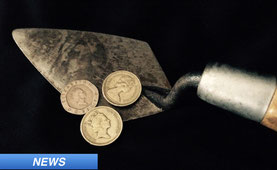
It sounds preposterous but I ran across a book called The Baking Powder Controversy written in 1904 by A. Cressy Morrison. It’s a two volume, 964 page tome and while not a riveting page turner, he does call the “controversy” the “Baking Powder War” by the second paragraph in the preface. Some wonderfully delightful lines follow. For example, in reference to baking powder, Morrison writes, “An unanswered indictment hangs like Damocles’ sword over the head of a captain of industry.” Damocles was servant to Dionysius, the 5th Century BC tyrant of Syracuse. Legend has it that Damocles was a notorious suck-up who one day declared that it would be wonderful to be king because of all the luxuries royalty enjoys. Dionysius said, cool, give it a try. Damocles jumped on the throne, relished the pampering, and then glanced up. And he saw a giant sword, pointy end aimed at his head, suspended from the ceiling by the slenderest of threads. Damocles said something along the lines of “so long and thanks for all the fish,” leapt from the throne and enjoyed servitude ever-after. Sword of Damocles. Baking powder. So dramatic! And that’s just the preface. Chapter One is entitled “Enemies of the Republic.” Oh my!
As far as I can tell, back in the day, when baking powder was new, it was made with cream of tartar, bicarbonate of soda, and starch. The point of baking powder is making baked goods rise without yeast, so thanks to baking powder people could make “quick breads” and cookies and biscuits and all manner of things delicious. Baking powder was super popular super quick and profits poured in. Would-be usurpers of the powder throne knew that cream of tartar was the star that leavened the baked goods, so the chemists got to work looking for a cheap cream of tartar alternative. Two emerged, aluminic sulphate and aluminic phosphate, collectively known as the alums. The tartar people weren’t going to let the alums take the cake so they committed “business as treason—-corruption as revolution,” according to the alums. The baking powder related corruption “flowed…from the boss, down through the police to the prostitute…and big throbbing arteries ran out through the country over the State to the Nation….” Take that apocalypse.
So why all the vitriol? According to the alums, the tartar people started a smear campaign, trying to convince the public that aluminic ingredients were toxic. Sometimes the smear tactics were aggressive, like when four members of the Thomas family, a family that enjoyed pancakes leavened with aluminic based baking powder, were poisoned. The tartar based Royal Baking Powder Company created advertisements saying the aluminic pancakes were to blame. Never mind the fact the Thomas family and the doctor that treated them said the real culprit was arsenic poisoning “from a newly painted sausage machine.” Which, editor’s note, arsenic on the sausage machine?? I read The Jungle. It’s amazing anyone lived past 1910. But I digress. The tartar people were accused of bribing politicians and anyone else useful in order to pass “pure food” laws that banned poisons like arsenic and ammonia, and yes “alums” from being used as food ingredients.
Sounds good, not having poisons in food. But what happened? Are the alums bad? Well, Mr. Alum went to Washington, and like Mr. Smith, he was very effective. Alum is still in some baking powders today, and you can even buy a whole container of just “Alum.” The McCormick spice company says to use it “in recipes to keep pickles, and other fruits and vegetables, firm and crisp.” Though in a nod to Mr. Cream of Tartar, there’s still a lingering feeling that maybe we shouldn’t eat alums….but why…..

Jennifer Riddle started her professional career as a happy field hand in the Nevada desert. She worked her way up to Principal Investigator and romped through the American Southwest and Great Basin for 15 years, stopping the romping only when she decided to join the Archaeology Almanac ranks and write articles for a living.



